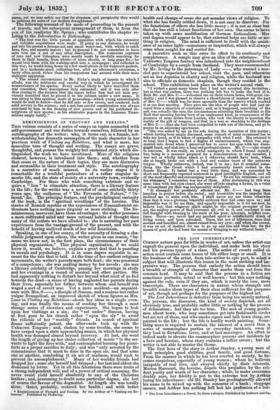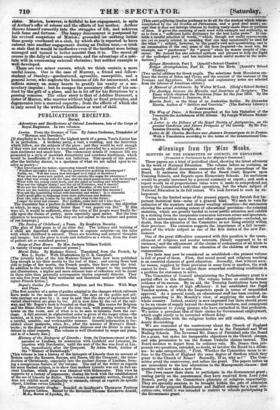THE LOST INHERITANCE. * COMMON nature goes for little in works
of art, unless the artist can
en t the general upon the individual, and make both his story an his persons types of a class. The series of events called an action must contain some lesson bf life either large or small. It is the business of the artist, from tale-writer to epic poet, to seleot a subject that will illustrate this lesson in the most striking and im- pressive way. The persons that embody the action should have a breadth or strength of character that marks them out from the common herd. It may be said that the persons in a fiction are sometimes portraits, actual or well known : but this says nothing: against the rule even if they are; which is rarely:the case, mere transcripts. There are characters in nature whose strength and breadth render them types of their class sufficient for the purposes' of art, though not perhaps for the purposes of the highest art.
The Lost Inheritance is defective from being too merely natural.. The persons, the discourse, the kind of society depicted, are all: obviously true, and probably suffer little or nothing by the process. of delineation ; but they are too true. The mob of your gentle-- men about town, who may sometimes get into fashionable ciroles- but are not of them, and who smoke cigars and talk town slang, are painted to the life ; but the life is hardly worth painting. Some-: thing more is required to sustain the interest of a novel ,then a: series of commonplace parties or everyday incidents, even if
they lead to flirtations, loves, and at last marriages. An effort is indeed made to elevate the commonplace persons and incidents by a hero and heroine, whose story contains a loftier career; but the Writer is not able to master the theme. The first hero of the story is Arthur Stanley, a young man of good principles, good abilities, good family, and good fortune. From the manner in which he has been courted in society, he be- comes suspicious; especially of young women ; whom he believes incapable of real love, and swayed chiefly by their interests. Marion Harcourt, the heroine, dispels this prejudice by the evi- dent purity and worth of her character ; while, to make assurance doubly sure, her fidelity is put to the extreme test by Arthur losing his inheritance: old Mr. Stanley has goodnaturedly allowed his name to be mixed up with the concerns of a bank; stoppage ensues, and Arthur has nothing left but his profession of a liar-
• The Lost Inheritance; a Novel. In three volumes. Published by Colburn and Co.
rister. Marion, however, is faithful to her engagement, in spite of Arthur's offer of release and the efforts of her mother. Arthur throws himself earnestly into the struggles of life, and achieves both fame and fortune. The happy denouement is postponed by his revived suspicions of Marion ; grounded on nothing better than gossip overheard at a club, by which she is reported to have entered into another engagement during an Italian tour,—a trick so stale that it would be ineffective even if the incident were better managed and turned to better account than it is. The moral of course is the folly of undue suspicion, and the advantage of a reso- lute will in overcoming external obstacles ; but neither example is well developed.
There are two minor careers, which we think contain a more useful lesson. One is the case of Murray, a friend and fellow- student of Stanley,—goodnatured, agreeable, susceptible, and a general lover, who neglects the business of life for amusement, and inflicts misery on many hearts to gratify his vanity or a mo- mentary impulse : but he escapes the pecuniary effects of his con- duct by the gift of a place, and be is let off for his flirtations by a passing remorse. The other story is that of Adeline Ilareourt, a sister of Marion, who marries without high or fixed principles, and degenerates into a married coquette • from the effects of which she is only saved by the writer's kindliness or want of skill.



























 Previous page
Previous page